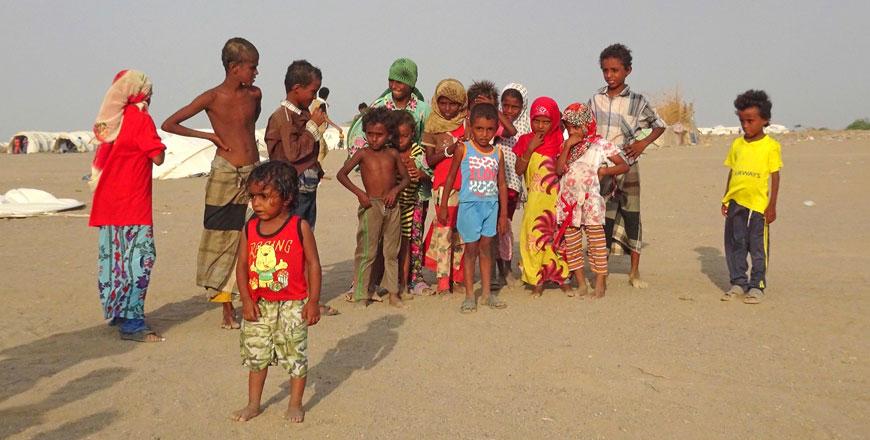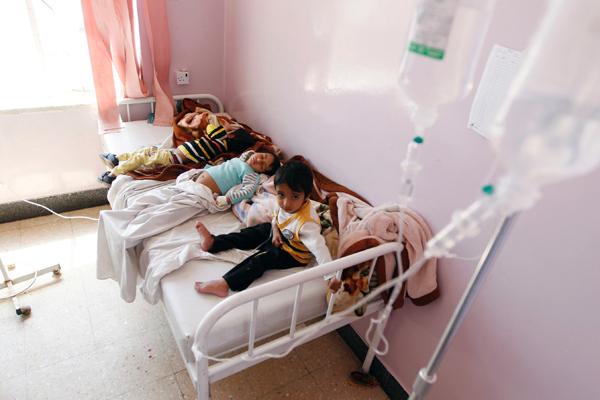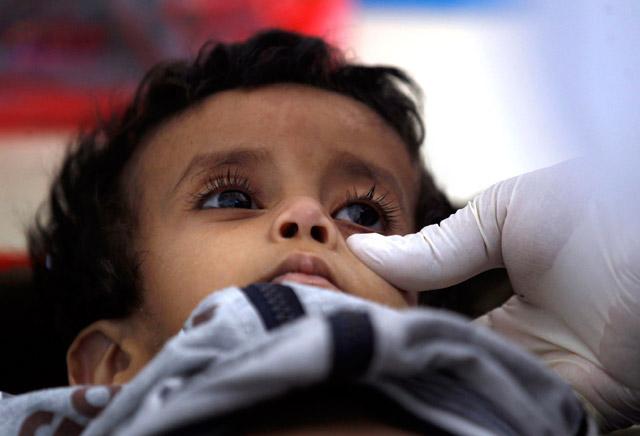You are here
Yemen cholera outbreak tops 10,000 cases per week — WHO
By Reuters - Oct 03,2018 - Last updated at Oct 03,2018

Imad (centre) and his sister Alia (foreground) are photographed with friends at Al Waara camp in the Khokha district, some 30 kilometres from the town of Hays, on Monday (AFP photo)
GENEVA — Yemen›s cholera outbreak — the worst in the world — is accelerating again, with roughly 10,000 suspected cases now reported per week, the latest data from the World Health Organisation (WHO) showed on Tuesday.
That is double the average rate for the first eight months of the year, when 154,527 suspected cases of cholera — which can kill a child within hours if untreated — were recorded across the country, with 196 deaths.
WHO spokesman Tarik Jasarevic said 185,160 suspected cholera cases were reported into September. Some 1.8 million Yemeni children are malnourished, making them more vulnerable to disease, the UN Children›s Fund (UNICEF) says.
They include nearly 400,000 whose lives are at risk from severe acute malnutrition.
Since Yemen’s cholera epidemic erupted in April 2017, a total of 1.2 million suspected cases have been reported with 2,515 deaths, Jasarevic told a news briefing. Children account for 30 per cent of infections.
“We have been seeing the number of cholera cases increasing in Yemen since June. This increase has been even more important in the last three weeks,” Jasarevic said.
In the first week of September, nearly 11,500 suspected cases were reported, up from 9,425 the week before, he said.
The charity Save the Children said air strikes by the Saudi-led coalition in late July had damaged a sanitation facility and water station that supplies water to Hodeida, a port city and supply lifeline held by Houthi forces.
“After this incident, suspected cholera cases almost doubled between July (732) and August (1,342) in Save the Children-supported health centres,” it said.
The WHO said 16 per cent of Yemen’s cholera cases were in Hodeida where only half of the health facilities are operational.
If caught early, the acute diarrhoea can be treated with oral hydration salts, but more severe cases require intravenous fluids and antibiotics.
The WHO is administering vaccinations, targeting 540,000 people in three vulnerable districts in Hodeidah and Ibb governorates. In a first round, 387,000 people — 72 per cent of those targeted — received an initial dose, Jasarevic said, adding that the organisation wanted to extend the programme to other parts of Yemen.
Related Articles
SANAA — The World Heath Organisation (WHO) said on Tuesday it had confirmed 11 cases of cholera in Yemen’s capital Sanaa, after the UN annou
GENEVA — Cholera has killed 1,170 people in war-ravaged Yemen and the number of suspected cases is now at nearly 2,000 a day, the World Heal
GENEVA — The number of suspected cholera cases in war-torn Yemen has risen to more than 100,000 since an outbreak began on April 27, the Wor


















